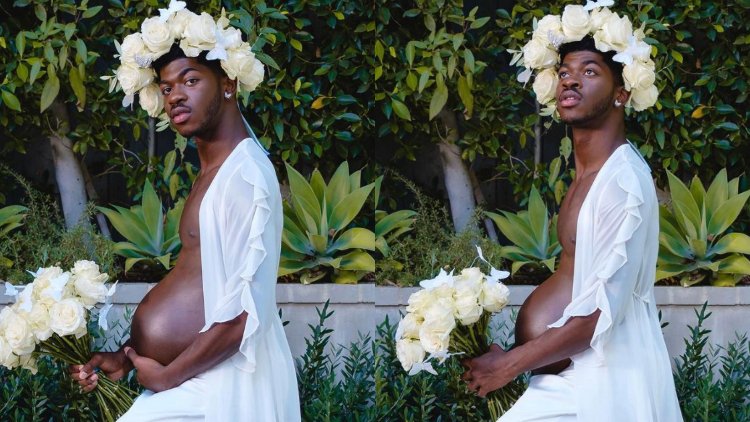Lil Nas X has developed into a singularly defining figure of his generation. He is an internet adept, multimedia jester, social provocateur, video visionary, purveyor of a young-gifted-and-gay-and-Black pleasure principle, and scourge of scolds and bigots. The remaining question, however, has been whether he’s equally vital as a musician. After surfacing in early 2019 via a TikTok challenge to turn his country-trap novelty song “Old Town Road” into the biggest, most debated song of 2019, the Atlanta-born performer seemed guaranteed to secure some lasting space in pop culture. Still, after the then-19-year-old’s follow-up 7 EP came out that June, it was fair to ask whether that role necessarily would be as a rapper-singer. Those tracks were carried up the charts by post-smash momentum, rescuing Nas X technically from one-hit-wonder status. But despite Grammy recognition, they struck me and many other critics as musically adequate at best.
After a pause for a refresh, though, the now-22-year-old made more pop history earlier this year when he released “Montero (Call Me by Your Name)”—as my colleague Chris Molanphy put it, the gayest No. 1 song of all time—followed by this summer’s “Industry Baby,” two singles that roiled the culture with their explicitly queer videos featuring, respectively, joyfully unhinged images of dude-on-devil dalliance and mass male nude prison-shower dancing. Though neither was as catchy as “Old Town Road”—other than the delta variant, what is?—Nas X and New York-based production duo Take a Daytrip made memorable hooks around flamenco guitar for the first song and stage-band-style horn triplets for the second.

The fuller test now comes with the release, at long last, of Montero, the debut full-length from the artist born Montero Lamar Hill—and its rollout this week raises that central conundrum again. The album is a leap from his past in both style and content, with compelling stuff to offer at nearly every turn. Next to the other two highly touted pop-rap releases of the past month, Kanye West’s Donda and Drake’s Certified Lover Boy, Nas X’s is by far the most consistently likable. Its highlights may not scrape the same plane of existence as West’s and Drake’s best tracks, but neither do its economical 41 minutes ever drag the listener through pestilent bogs of self-indulgent repetition the way those records do. As the kids say, it’s a no-skips package.
Still, even after several complete listens, few moments on Montero reverberate in my mind as vividly as all the viral action Nas X has generated around it in other media. His music can’t match the effortless assuredness of the parody billboards he mounted and the hilarious “pregnancy” photos he staged leading up to a live “talk show” on YouTube Thursday night, in which Nas X juggled with gusto the roles of smarmy host, swollen-bellied guest, and hyped-up audience member, climaxing with him “giving birth” to the album as well as premiering the video for new single “That’s What I Want.” The song itself is fantastic, an anthem of same-sex longing that pays giddy stylistic homage to Outkast’s “Hey Ya!” complete with the acoustic strums and handclaps and raindrop-bloopy synth notes. But the video is a tour de force performance of in-your-face queerness (also featuring the icon Billy Porter); he’s one of a pair of pink-clad football players making out extensively in the locker room, then strips down Brokeback-style with another cowboy camped out in the wilderness, before ending up alone in a church in full bridal drag playing an electric guitar solo.
As a vocalist, Nas X doesn’t have the verve he has as a visual performer, let alone the distinctive stamp you immediately hear when his guests sound off, like Megan Thee Stallion (with an album-highlight turn on “Dolla Sign Slime”), Doja Cat (on “Scoop”), or Miley Cyrus (dueting on sweet closer “Am I Dreaming”)—even Elton John just playing a few bars of piano on “One of Me” commands the sonic arena in a way the supposed main attraction can’t equal. Likewise, Nas X’s lyrics are strangely absent of the effervescent wit of even his everyday tweets. Given a personality whose humor and sparkle are used to trash-compact his ignorant detractors, it’s confusing how underplayed those elements are in the songs. No doubt he fears being reduced to the comical figure from “Old Town Road,” but it’s only in music, among all his other performances, that he deprives himself of one of his strongest assets.
Nonetheless, Montero has ample charms. It’s probably wise that it doesn’t revisit the country twang of his breakout hit, but it doesn’t just fall back on conventional rap sounds, instead of using lots of string- and horn-based hooks to further Nas X’s identity as an artist of a beyond-genre generation. On “Life After Salem” and the enchanting “Lost in the Citadel,” that extends to full emo-rock guitar workouts (leaning toward metal on “Salem”) among which Nas X sounds quite at home. More substantially, while it predictably dwells on proving his doubters wrong (an audio clip of multiple award announcements on the track “Don’t Want It” is an unnecessary intrusion), the album’s primary concerns are much more vulnerable: his longing for love and his reckoning with the pain, including suicidal ideation, he endured growing up as a closeted Black Southerner in a churchgoing family with a mother dealing with drug addiction. Those armfuls of burdens come up toward the end of the strong second track, “Dead Right Now,” then dominate the second half, in songs like “Tales of Dominica,” “Void,” and “Sun Goes Down” (“Always thinkin’, Why my lips so big?/ Was I too dark? Can they sense my fears?/ These gay thoughts would always haunt me/ I prayed God would take it from me”). Even album-closer “Am I Dreaming?” with Cyrus—who picks up the family tradition hereafter dad Billy Ray’s well-known remix spot on “Old Town Road”—ends on an ambiguous and ominous note of farewell rather than the upbeat healing-and-recovery of a conventional pop album arc.
For a lot of listeners, those feelings are what will matter most about Montero, irrespective of whether it shows Nas X’s potential to the fullest. Those are fans such as the user who wrote on the “Sun Goes Down” Genius lyrics page: “Like Montero, I’m black, queer, feel very lonely most of the time, and I am growing up in a household that isn’t all for the gay lifestyle due to the Christian religion. … I cannot tell you how many times I have gotten into trouble with my mother just because I’m queer. It hurts … so thank you Montero, yet again, for giving me something to lean on and relate to.” It can be too simple, now that he’s been in the public eye a while, to rush past how little precedent Nas X really has in mainstream pop culture (especially with Frank Ocean indefinitely AWOL). Here is someone singing the words that the likes of Little Richard or Luther Vandross never put on the radio, for people who may not, for instance, have anyone nearby to point them to James Baldwin or Audre Lorde. If Montero doesn’t brim with the glitter and wit Lil Nas X can make look so easy elsewhere, maybe that’s because it needed to take its time laying out how far from easy it’s been, before carrying on wherever else the still-so-young Montero might go

